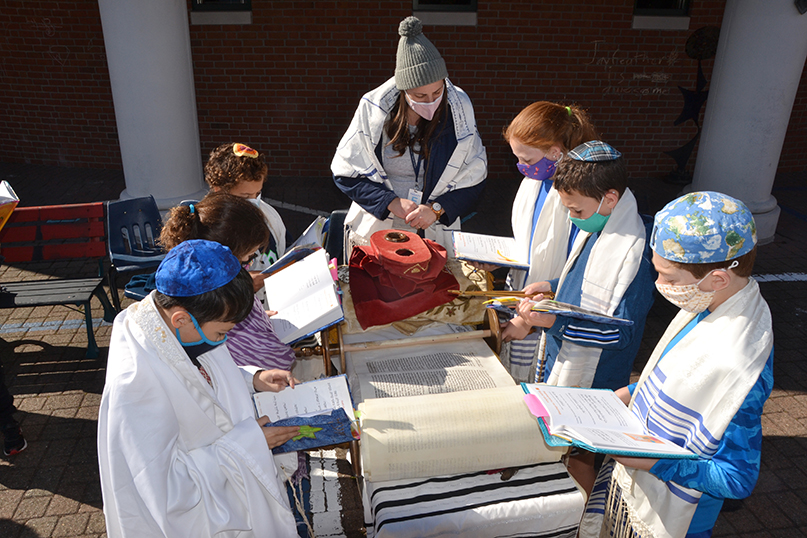
By Stacey Dresner
WEST HARTFORD – Solomon Schechter Day School of Greater Hartford will mark its 50th anniversary on Sunday, March 14 with a virtual celebration that will tip its hat to the school’s founders and to the families who have supported the school for the past five decades.
“It is a time for the community to come together to honor all that has come before us,” said Head of School Andrea Kasper. “We are on good footing and looking forward to the next 50 years.”
Along with speeches by Kaspar and Lauren Eisen, president of the Schechter Board, and entertainment by comedian Joel Chasnoff, the evening will highlight families who have been Schechter mainstays. This includes the family of Adam z”l and Alice Leshem, whose three children and 11 grandchildren – three of whom are currently enrolled — attended Schechter.
“We came the first year it was in existence,” recalls Alice Leshem. “It was just like yesterday that we walked into The Emanuel Synagogue basement. It’s amazing how fast it flew by.”
Solomon Schechter was founded in 1971 by a group of West Hartford parents who sought a Conservative Jewish day school education for their children. At that time, the Modern Orthodox Hartford Yeshiva was the only Jewish day school in the area. (The Yeshiva morphed into the Bess and Paul Sigel Hebrew Academy in Bloomfield, then merged in 20?? with the Hebrew High School of New England to become the New England Jewish Academy.)
“There was a group of people who had been thinking about starting a Conservative day school for many years, including Rabbi Stanley Kessler [then spiritual leader of Beth El Temple in West Hartford] and Rabbi Philip Lazowski [then spiritual leader of Beth Hillel Synagogue in Bloomfield]. But it was Rabbi Howard Singer of The Emanuel Synagogue who got it moving,” Schechter founder Arlene Neiditz told the Jewish Ledger in 2011.
“In the ’60s and ’70s, during a time of ethnic pride in the U.S., many young parents in the more liberal Jewish movements began to feel that the afternoon religious school was not the sufficient or efficient way to create an environment where kids would really be in love with their Jewish heritage,” said Neiditz, who chaired the original education committee and served as Schechter’s second president. “It was a way to offer a more enhanced learning environment for Jewish children in a very positive Jewish setting, to give them the education and the confidence to be affirming, affirmative Jews.”
Founding Schechter was a grass-roots effort led by the parents who held Board meetings in their living rooms; organized fundraising events and donated funds for textbooks and teachers’ salaries; and oversaw the required legal and state licensing work.
West Hartford’s Emanuel Synagogue offered to house the school in its basement and Ruth Weiner was named organizing principal. When the classrooms were not quite ready the day before school was set to begin, the parents pitched in and saw to it that classes could begin the next day. Some parents even taught classes until enough teachers were hired.
“They took their dream and their sweat and tears and here we are,” Kasper says. “Like the founding of any start-up you have a set of people who are ready to just go all in and do whatever it takes to make it happen…One of the things that really attracted me to the school when I was interviewing was a very strong sense that people in this school community were all really willing to roll up their sleeves and do what had to be done. As I was learning about more of the history of Schechter I thought, that’s in the DNA; that is how it was founded, it’s how it was maintained and how it continues.”
At first, Solomon Schechter’s original open classroom concept, imported from England in the ‘70s and popular throughout the U.S. at that time, made it possible to function with a small student body. When the school opened, 32 children were enrolled in kindergarten through second grade. For a time, Schechter consisted of one classroom for all its students, but grades were added gradually as the students progressed and enrollment grew.
“At its founding there was a really strong feeling from these families that they wanted a Conservative Jewish day school, an option that wasn’t Orthodox. And that piece is probably what has evolved the most,” says Kasper. “We are a school that offers a non-Orthodox day school education, but rather than define us as to what we aren’t, I think really what we have become is a Jewish community day school where we really run the entire gamut from secular Americans to Israelis and Russians to Orthodox families. I think one of the beautiful things that has emerged in this school is a real sense of inclusivity and non-judgment. However you come is how we welcome you. And I think that culture is something that has evolved here over time and it has been a real strength for the school.”
A close-knit community
After its growth during the first decade, Schechter moved to the building that formerly housed Bridle Path Elementary School and Hartford Christian Academy on Buena Vista Road in West Hartford. The building was renovated and a new wing was added in 2000.
“It’s really a family,” says Board president Lauren Eisen. “My daughter is a graduate and my son, an eighth-grader, has been there since the twos and all the way through to middle school. Of course, people have come and gone, but there is a core group and everybody in the school is like a family — the staff and the teachers and the students.
“Before Covid, on Friday mornings, we used to have this wonderful Shabbat program where the whole school would come with families in the morning before schools started,” Eisen adds. “It was so wonderful that we would all be starting Shabbat together. It’s a really nice, warm, comfortable environment.”
Ed Leshem recalls attending Schechter when it was still located at The Emanuel Synagogue.
“It was very similar to how it is now. It was pretty small but a really comfortable, safe and family-friendly environment,” he recalls. “We ended up, 20-some years later, having our kids go there. It was nice to attend and then send our kids to a school with such a close-knit community of students and parents.”
Alice Leshem says that she and her husband, who arrived in the U.S. in 1968 from Israel, chose Schechter because their children were bilingual – in both English and Hebrew – and because they liked the open classrooms and the individualized attention.
But now, she says the sense of Jewish identity that Schechter fosters and its impact on her children and grandchildren, is just as important to her, citing anti-Israel sentiment on college campuses and the Boycott, Divestment and Sanctions (BDS) movement.
“It gave the children an identity; they know who they are,” she says. “ And the children at Solomon Schechter know exactly who they are. They are Jews and they are comfortable in their own skin.”
Main Photo: Sarah Kay Montag, Solomon Schechter Day School’s director of teaching and learning, leads 5th graders in a Torah reading, as part of a pre-Simchat Torah service. Owing to the pandemic, the Torah reading was held outdoors.








 Southern New England Jewish Ledger
Southern New England Jewish Ledger









